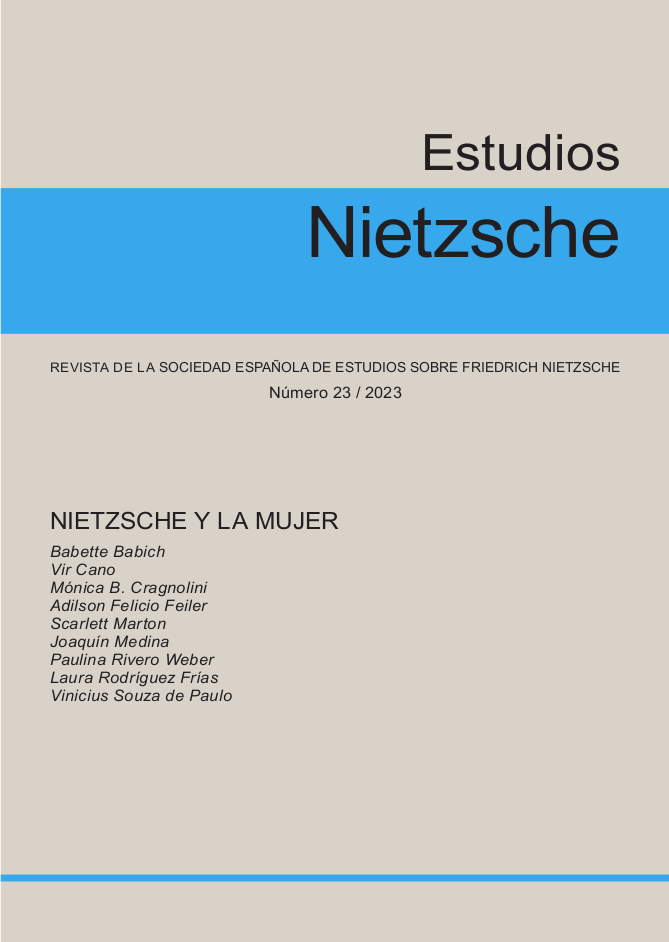That Pregnant and Fatal Will to Power: An Approach to the issue of «Women» in Nietzschean Work
DOI:
https://doi.org/10.24310/EstudiosNIETen.vi23.15810Keywords:
pregnant woman, life, women, will to powerAbstract
This paper seeks to analyze those aspects in which certain Nietzschean fascination with the feminine can be observed, without thereby closing the discussion about the misogynist elements that inhabit the corpus of his philosophy. For this, I am going to delve into the claim and affirmation of the feminine as a fundamental conceptual key to interpret the thesis on life and the will to power. The aim will be to show that the woman affirmed by Nietzsche identifies with the figure of the pregnant woman, who is capable of creating beyond herself and, therefore, is also capable of perishing.
Downloads
Metrics
References
BUTLER, Judith, Gender Trouble. Feminism and the Subverson of Identity, New York y London, Routledge, 2006.
BUTLER, Judith, Bodies That Matter: On the Discursive Limits of Sex, New York y London: Routledge, 2011.
BURGOS DÍAZ, Elvira, «Afirmando las diferencias. El feminismo de Nietzsche»: Asparkía. Investigació Feminista 11 (2000), p. 77.
CACCIARI, Massimo, Krisis. Ensayo sobre la crisis del pensamiento negativo de Nietzsche a Wittgenstein, México: Siglo XXI, 1992.
CHODOROW, Nancy, The Reproduction of Mothering, Berkeley: University of California Press, 1978.
CRAGNOLINI, Mónica, Nietzsche, camino y demora, Buenos Aires: EUDEBA, 1998.
CRAGNOLINI, Mónica, «Temblores del pensar: Nietzsche, Blanchot, Derrida» en Derrida, un pensador del resto, Bs. As.: La cebra, 2007.
DERRIDA, Jacques, Dar el tiempo, 1. La moneda falsa, trad. C. de Peretti, Barcelona: Paidós, 1995.
DERRIDA, Jacques, Espolones. Los estilos de Nietzsche, trad. de M. Arranz Lázaro, Valencia: Pre-Textos, 1997.
DERRIDA, Jacques, La diseminación, Madrid: Fundamento, 1975.
DERRIDA, Jacques, The Ear of the Other. Otobiography, Transference, Translation, Lincoln and London: University of Nebraska Press, 1982.
FRIEDAN, Betty, The Feminine Mystique, New York W. W Norton and Company, 1962.
FIRESTONE, Shulamith, The Dialect of Sex, London: Paladin, 1972.
FOUCAULT, Michel, Historia de la sexualidad. I. La voluntad de saber, trad. U. Guiñazú, Madrid: Siglo XXI, 1995.
KAUFMANN, Walter, Nietzsche. Philosopher, Psychologist, Antichrist, New Jersey: Princeton University Press, 1974.
KOFMAN, Sarah, Nietzsche et la scène philosophique, Paris: Galilée, 1986.
MILLET, Kate, Sexual Politics. New York: Doubleday & Company, 1970.
MOORE, Gregory, «Nietzsche and the Evolutionary Theory» en K. Ansell-Pearson., A Companion to Nietzsche, Oxford: Blackwell Publishing, 2006.
NESBITT OPPEL, Frances, Nietzsche on Gender. Beyond Man and Woman, Charlottesville and London: University of Virginia Press, 2005.
NIETZSCHE, Friedrich, Así habló Zaratustra, trad. A. Sánchez Pascual, Buenos Aires: Altaya, 1997.
NIETZSCHE, Friedrich, Crepúsculo de los ídolos, trad. A. Sánchez Pascual, Madrid: Alianza, 1998.
NIETZSCHE, Friedrich, Fragmentos póstumos (4 vols., edición dirigida por Diego Sánchez Meca), Tecnos, Madrid, vol. IV, 2006.
NIETZSCHE, Friedrich, La ciencia jovial, trad. J. Jara, Venezuela: Monte Ávila Editores, 1990
NIETZSCHE, Friedrich, La genealogía de la moral, trad. A. Sánchez Pascual, Buenos Aires: Alianza.
NIETZSCHE, Friedrich, Sämtliche Werke. Kritische Studienausgabe in 15 Bänden, Herausgegeben von G. Colli und M. Montinari, Deutscher Taschenbuch Verlag und Walter de Gruyter, Berlin/New York, 1999.
PRECIADO, Paul, Testo yonki, Madrid: Espasa-Calpe, 2008.
OLIVER, Kelly and PEARSALL, Marilyn, Feminist Interpretation of Nietzsche, Pennsylvania: The Pennsylvania State University Press, 1998.
OLIVER, Kelly, Womanizing Nietzsche. Philosophy´s Relation to the “Femenine”, New York-London: Routledge, 1995.
STIEGLER, Barbara, Nietzsche et la biologie, Paris: Puf, 2001.
VATTIMO, Gianni, Introducción a Nietzsche, trad. J. Binaghi, Barcelona: Península, 1996.
WITTIG, Monique, El pensamiento heterosexual y otros ensayos, trad. J. Sáez y P. Vidarte, Madrid, Egales, 2006.
Downloads
Published
How to Cite
Issue
Section
License
As of issue 21 (2021) this journal is published only in open access (diamond route).
From that number 21, like the previous numbers published in NIETZSCHE STUDIES, they are subject to the Creative Commons Acknowledgment-NoComercia-ShareIgual 4.0 license, the full text of which can be consulted at <http://creativecommons.org/licenses/by-nc-sa/4.0 >
It is the responsibility of the authors to obtain the necessary permissions of the images that are subject to copyright.
This work is licensed under a Creative Commons Attribution-NonCommercial-ShareAlike 4.0 International License.
Copyright generates two different rights: moral rights and patrimonial rights that EJFB recognizes and respects. Moral rights are those relating to the recognition of the authorship. They are rights of a personal nature that are perpetual, inalienable, unseizable and imprescriptible as consequence of the indivisible union of the author and his/her work.
Patrimonial rights are those that can be derived from the reproduction, distribution, adaptation or communication of the work, among others.







11.png)
